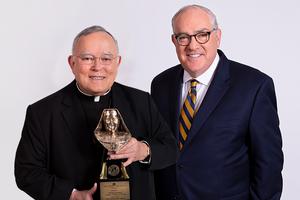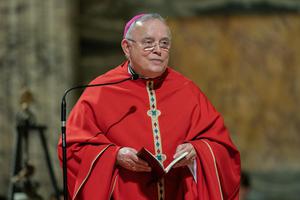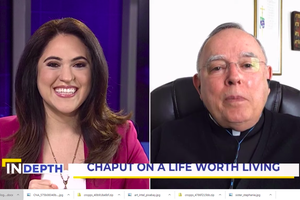Jesuit Journal’s Entry at Odds With Synod’s Final Report
Critics say Father Antonio Spadaro’s November reflection on the 2015 synod in La Civiltà Cattolica continues to push a narrative that is contrary to Church teaching.

VATICAN CITY — In early November, the editor of an influential Jesuit periodical wrote a reflection on the Ordinary Synod of Bishops on the Family in which he controversially claimed the meeting “laid the foundations” for civilly remarried divorcees to be admitted to the sacraments.
But according to synod fathers who have spoken with the Register about the matter, Father Antonio Spadaro’s interpretation is directly contrary to what the synod actually indicated with respect to the matter.
Jesuit Father Antonio Spadaro, editor of La Civiltà Cattolica, which is always screened by the Secretariat of State, said Paragraphs 84-86 of the synod’s final report relating to pastoral care for remarried divorcees underline the importance of pastoral “discernment” on a case-by-case basis (the primacy of individual conscience), “without putting any limits on integration, as appeared in the past.”
Noting that the report says such discernment would be guided by a priest in the “internal forum” (in the confessional), Father Spadaro said that “concerning access to the sacraments, the ordinary synod has, therefore, effectively laid the foundations, opening a door” that had been “closed” at the “previous synod.”
With the exception of couples who can live in continence as “brother and sister,” Catholics who civilly remarry following divorce have always been prohibited from receiving holy Communion unless they obtain declarations of nullity of their first marriage. Based on Christ’s teaching (Mark 10:2-12), those who divorce and subsequently remarry are committing adultery.
Father Spadaro’s comments contradict those of synod fathers such as Cardinal George Pell, who have said the synod excluded such a possibility. “There is no mention anywhere of Communion for the divorced and remarried,” Cardinal Pell told the Register Oct. 26, adding it was “not one of the possibilities that was floated.”
This contradictory reading of the paragraphs (Cardinal Walter Kasper, a leading proponent for such a change, also believes it opens a door to the sacraments for remarried divorcees) is possible because the paragraphs fail to explicitly rule out Communion for remarried divorcees. This is in contrast to John Paul II’s 1981 apostolic exhortation Familiaris Consortio, in which he makes the point clear: “The Church reaffirms her practice, which is based upon sacred Scripture, of not admitting to Eucharistic Communion divorced persons who have remarried. They are unable to be admitted thereto from the fact that their state and condition of life objectively contradict that union of love between Christ and the Church which is signified and effected by the Eucharist. Besides this, there is another special pastoral reason: If these people were admitted to the Eucharist, the faithful would be led into error and confusion regarding the Church's teaching about the indissolubility of marriage (84).
Cardinal Napier
Cardinal Wilfrid Napier of Durban, South Africa, a co-president of the last synod, said that when he first read the paragraphs, he “took them at face value” and felt they were “reinforcing or at least restating what St. John Paul II says in Familiaris Consortio.” But at second glance, he said “the ambiguity stands out more clearly, which makes it possible to interpret these paragraphs almost against what Familiaris Consortio is saying.”
Several commentators have especially criticized the interpretation of Father Spadaro and others of Paragraph 86’s mention of the “internal forum” as a means to admit remarried divorcees to Communion. Among the criticisms is that such an approach does not allow an individual and his or her confessor to assess objectively whether admission to the sacraments is possible, as this decision may be assigned instead to the subjective conscience of the individual.
“The case of internal forum and ministering to individuals is for ministers to help lead such people and individuals to the realization of their sinful situation and work on it with the hope of leading them to addressing the situation honestly,” explained synod father Archbishop Matthew Ndagoso of Kaduna, Nigeria. Canonist Ed Peters has also argued that, canonically speaking, the internal forum is inappropriate for guiding remarried divorcees to holy Communion.
Underlining the lack of clarity in Paragraphs 84-86, Cardinal Napier expressed concern that after the final report quotes Pope John Paul in Paragraph 85, it is “at pains to move the argument from the objective to the subjective, in such a way that the objective disappears.”
The cardinal added that this impression is later “reinforced” in the paragraph, by the citation of Canon 1735 and the Pontifical Council for Legislative Texts (June 24 Declaration, 2a). “These two citations are tantamount to saying more weight must be given to the subjective,” he told the Register Nov. 20, but added that some ambiguity in the text is likely to “creep in” when arguing “such a tight line” between what the Church is saying is the objective moral truth about matters like the reception of Communion and an individual’s subjective moral conscience.
Archbishop Ndagoso said “only people with personal agendas” would see the paragraphs as “opening a door” to the sacraments, especially when taken “in the context of the whole document.”
“Unfortunately, there are people who have made up their minds to do what they want to do regardless of Church teachings,” he told the Register. “It is indeed a very dangerous and misleading reading of the text.”
Three Dangers Identified
Dominican Father Thomas Petri, vice president and academic dean of the Pontifical Faculty of the Immaculate Conception at the Dominican House of Studies in Washington, specified three key dangers with Father Spadaro’s assertions and highlighted some ambiguities in the paragraphs.
Firstly, he said the Jesuit’s reading would essentially imply that the Church, John Paul II and the Catechism of the Catholic Church “have all been wrong and limited.” Paragraph 84 in Familiaris Consortio, he explained, was clear that those who have divorced and remarried, “regardless of the subjective claims of their conscience,” may not be admitted to Communion.
John Paul also mentioned the danger of the faithful being “led into error and confusion” regarding the Church’s teaching on the indissolubility of marriage, while stressing that those who have divorced and remarried should be encouraged to “attend” Mass. Each of these points was omitted in the paragraphs, Father Petri noted.
A second danger was the “exaltation of subjective conscience.” Father Petri stressed that Gaudium et Spes was clear “that the conscience can be wrong” and that John Paul II, in his encyclical Veritatis Splendor, was “very critical” of the notion that moral judgment is “true” merely because it has its origin in conscience. The American Dominican added that the Catechism further emphasizes what Pope Francis has also stressed: that remarried divorcees remain in communion with the Church based on their baptism, even though that doesn’t make them eligible to receive Communion.
A final, third danger is Father Spadaro’s belief that being in ecclesial communion must surely arrive, “sooner or later, at sacramental Communion.” Father Petri said he found that “very odd,” as the Church does not, for example, recognize full communion with Protestants “because of objective barriers,” and so they are not admitted to Communion. He said it is “simply theologically erroneous” to assert that ecclesial communion necessarily requires eucharistic Communion and added that neither was it true, as Father Spadaro maintains, that the final synod report placed no limit on individual discernment. “It most certainly does place limits: truth, charity, the Church and its teaching,” Father Petri said.
Additional Criticisms
In comments to the Register, Father George Woodall, professor of moral theology and bioethics at Rome’s Regina Apostolorum university, challenged the Jesuit on similar key points, as well as a number of others.
He said Father Spadaro misinterprets Jesus’ clear teaching on the indissolubility of marriage and “takes no account” of St. Paul’s refusal either to “dilute the teaching received from the Lord or to sanction a pastoral practice which would seem to call into question or appear to undermine that dominical teaching.”
He said the Jesuit editor of La Civilta Cattolica also “completely ignores” the “seriously problematic” post-Vatican II interpretations of what Gaudium et Spes teaches on conscience.
“The idea that conscience is to be followed merely because of personal conviction is false,” he said, adding that Father Spadaro also “pays no heed” to the fact that conscience can err and can do so knowingly. The Jesuit also leaves aside clarifications that have been made in recent decades on the issue of conscience and discernment of truth, thus making his observations “unreliable,” Father Woodall argued.
According to Father Woodall, Father Spadaro makes the “very serious error” of ignoring the fact that entering into a second marriage, even if for the sake of children, places those in a second union “in a position contrary” to Jesus’ teaching on remarriage. Even if subjective culpability may be reduced, such as a spouse being “innocent” of causing the separation or divorce, this does not mean this act is not ascribed to those concerned. “This is the nub of the problem here, something to which [Father] Spadaro does not advert,” Father Woodall said.
He also took Father Spadaro to task for arguing that divorced-and-remarried Catholics could be admitted to Communion simply because John Paul II’s clear statement against such an admission is omitted in Paragraphs 84-86. Such an omission from the paragraphs “cannot have been accidental,” Father Woodall said.
He further pointed out that remarried divorcees are not excommunicated and that “no one has suggested that they are.” But like Father Petri, Father Woodall rejected Father Spadaro’s reasoning that because someone is in “spiritual communion” they should eventually receive the Eucharist. He agreed that “a great deal” can be done to integrate such people into the Church, but stressed that prior to the Second Vatican Council many came to Mass but did not receive holy Communion for a variety of reasons, possibly because they had not observed the fasting laws of the time, but were still “truly and fully part of the Church.
‘Caricature’
Father Woodall also accused Father Spadaro of reducing to “caricature” those bishops who uphold doctrine, “as if they were interested only in condemnations, anathemas, rigid and static doctrine.” He has “not the slightest trace of respect for them, or the people who struggle with the pressures of life but who strive to abide by the teaching of Jesus, which the Catholic Church has always upheld,” the English priest said.
“To suggest or to imply that all or most bishops or people of this opinion are pharisaic is grossly unjust to them and to the Church,” he continued. “There is not the slightest trace of understanding, much less of compassion or mercy, towards those who are genuinely and seriously worried that the teaching of Jesus on marriage may be at risk of being undermined. There is no effort on his part to open up ways to convince them that their anxieties may be exaggerated or misplaced, none of the much vaunted dialogue.”
He said Father Spadaro was “correct” to note positive images employed by the synod fathers of journeying together, being welcoming and accompaniment, but that is only useful if it is “anchored in truth,” specifically the “moral truth as to how we are to live if we wish to follow the Lord.”
His comments echoed those of Archbishop Charles Chaput of Philadelphia. Writing in the December edition of First Things, the American synod father stressed the Church “cannot be merciful without being truthful” and that what “ensues from an untruthful teaching about and practice of the sacraments is not a more zealous evangelical life but its collapse.”
Father Woodall said that adhering to the Church’s teaching and the “great Tradition of the Church” is “very far from being a case of rigidity or a question of desiring to throw stones or to hurl anathemas at anyone; it is a question of fidelity to Jesus Christ, fidelity to truth, fidelity to his Gospel, including his gospel on marriage and family life.”
“This is a concern that is more than legitimate, but it is one that [Father] Spadaro signally fails to comprehend or to acknowledge in those with whom he disagrees,” Father Woodall concluded.
Despite Father Spadaro’s assertions, Father Petri did not predict the Pope will agree with this interpretation. “How could he?” he asked. “Not only would the Catechism have to be re-written, but it would go directly against the words and teaching of previous popes.”
Even if the Pope’s post-synodal apostolic exhortation has the same ambiguity as the final synod document, he still thinks its interpretation can and must be based “on the preceding tradition.” He expected Pope Francis to “again challenge pastors to meet and accompany those whose lives are broken and to bring them closer to Jesus Christ and his Church.”
The Pope’s Assurances
Archbishop Ndagoso reiterated the Pope’s assurances that Church teaching won’t be changed and said he is “sure” that with the final report and the guidance of the Holy Spirit, the Pope will, “as always, carry all along” in any apostolic exhortation.
In a talk given in Rome Nov. 23, Cardinal Pell expressed similar confidence, saying the apostolic exhortation will reiterate the Church’s “essential tradition” and emphasize that the internal forum “can only be used to better understand God’s will” and can “never be used to disregard, distort or refute established Church teaching.”
For his part, despite the lack of clarity over Paragraphs 84-86, Cardinal Napier was confident “middle-of-the-road Catholics” would give “due and proper weight” to John Paul II’s words in Paragraph 84 of Familiaris Consortio, which “are much clearer.” He was also confident the Pope would “resolve this” when he writes his final document on the synod.
“It is not so easy to open up reception of the sacraments willy-nilly to those in irregular marriages,” Cardinal Napier said. “I would expect that Pope Francis’ document will eliminate such ambiguities.”
Edward Pentin is the Register’s Rome correspondent.
- Keywords:
- archbishop charles chaput
- archbishop matthew ndagoso
- cardinal george pell
- cardinal walter kasper
- cardinal wilfrid napier
- edward pentin
- familiaris consortio
- father antonio spadaro
- la civilta cattolica
- st. john paul ii
- synod_2o15


















